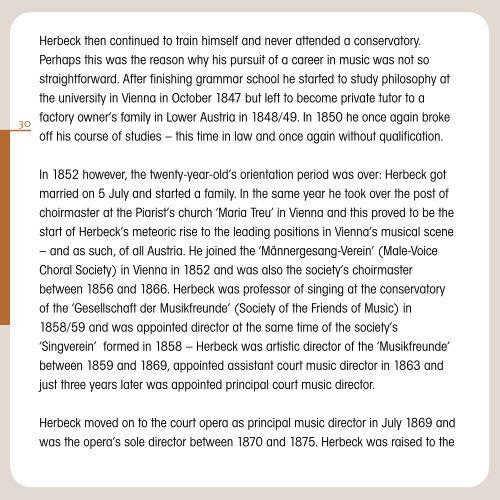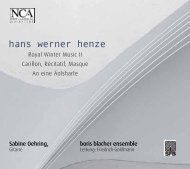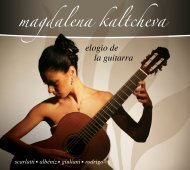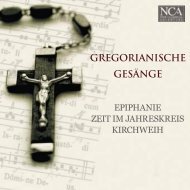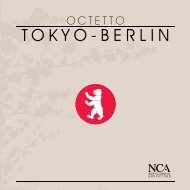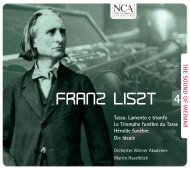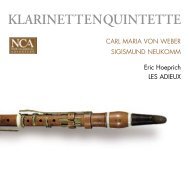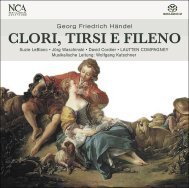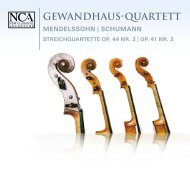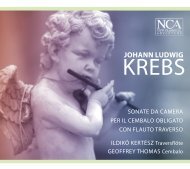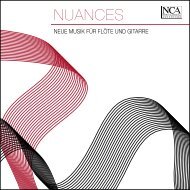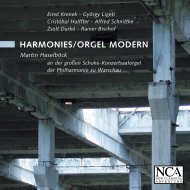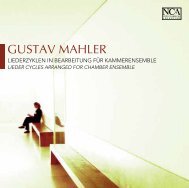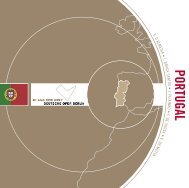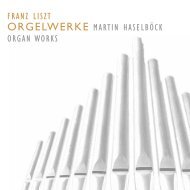JOHANN VON HERBECK - nca - new classical adventure
JOHANN VON HERBECK - nca - new classical adventure
JOHANN VON HERBECK - nca - new classical adventure
Create successful ePaper yourself
Turn your PDF publications into a flip-book with our unique Google optimized e-Paper software.
Herbeck then continued to train himself and never attended a conservatory.<br />
Perhaps this was the reason why his pursuit of a career in music was not so<br />
straightforward. After finishing grammar school he started to study philosophy at<br />
the university in Vienna in October 1847 but left to become private tutor to a<br />
factory owner’s family in Lower Austria in 1848/49. In 1850 he once again broke<br />
off his course of studies – this time in law and once again without qualification.<br />
nobility on 5 February 1874 in recognition of his services to the musical scene in<br />
Vienna. Following his resignation from the post of court opera director, Herbeck<br />
succeeded Johannes Brahms in 1875 as director of concerts given by the<br />
‘Gesellschaft der Musikfreunde’. Herbeck, who had suffered with lung complaints<br />
several times during his life, died as the result of pneumonia on 28 October 1877,<br />
at the age of just forty-five.<br />
30<br />
31<br />
In 1852 however, the twenty-year-old’s orientation period was over: Herbeck got<br />
married on 5 July and started a family. In the same year he took over the post of<br />
choirmaster at the Piarist’s church ‘Maria Treu’ in Vienna and this proved to be the<br />
start of Herbeck’s meteoric rise to the leading positions in Vienna’s musical scene<br />
– and as such, of all Austria. He joined the ‘Männergesang-Verein’ (Male-Voice<br />
Choral Society) in Vienna in 1852 and was also the society’s choirmaster<br />
between 1856 and 1866. Herbeck was professor of singing at the conservatory<br />
of the ‘Gesellschaft der Musikfreunde’ (Society of the Friends of Music) in<br />
1858/59 and was appointed director at the same time of the society’s<br />
‘Singverein’ formed in 1858 – Herbeck was artistic director of the ‘Musikfreunde’<br />
between 1859 and 1869, appointed assistant court music director in 1863 and<br />
just three years later was appointed principal court music director.<br />
Johann von Herbeck kept exploiting his outstanding position in Vienna’s music<br />
scene to champion the works of composers who had unjustly fallen into oblivion<br />
or whose works had become neglected. After he had been given the score to<br />
Schubert’s Symphony in B minor – in May 1865 by Schubert’s friend from<br />
university Anselm Hüttenbrenner – he already conducted the premiere<br />
performance of the Unfinished on 17 December of the same year. He also<br />
integrated Schubert’s Masses into the court orchestra’s repertoire, published the<br />
first complete edition of Schubert’s Choral Works in 1865 and played a<br />
substantial role in the erection of a monument to the composer. Herbeck was<br />
friends with Franz Liszt, spoke out in favour of Wagner and Verdi at the court<br />
opera, supported Karl Goldmark – and in 1868, arranged for the Linz cathedral<br />
organist Anton Bruckner to be appointed court organist in Vienna and professor of<br />
harmony, counterpoint and organ playing at the conservatory of the ‘Gesellschaft<br />
der Musikfreunde’. Herbeck recognised Bruckner’s revolutionary importance as a<br />
symphonist before anyone else and spoke up for the Upper Austrian all of his life.<br />
Herbeck moved on to the court opera as principal music director in July 1869 and<br />
was the opera’s sole director between 1870 and 1875. Herbeck was raised to the


